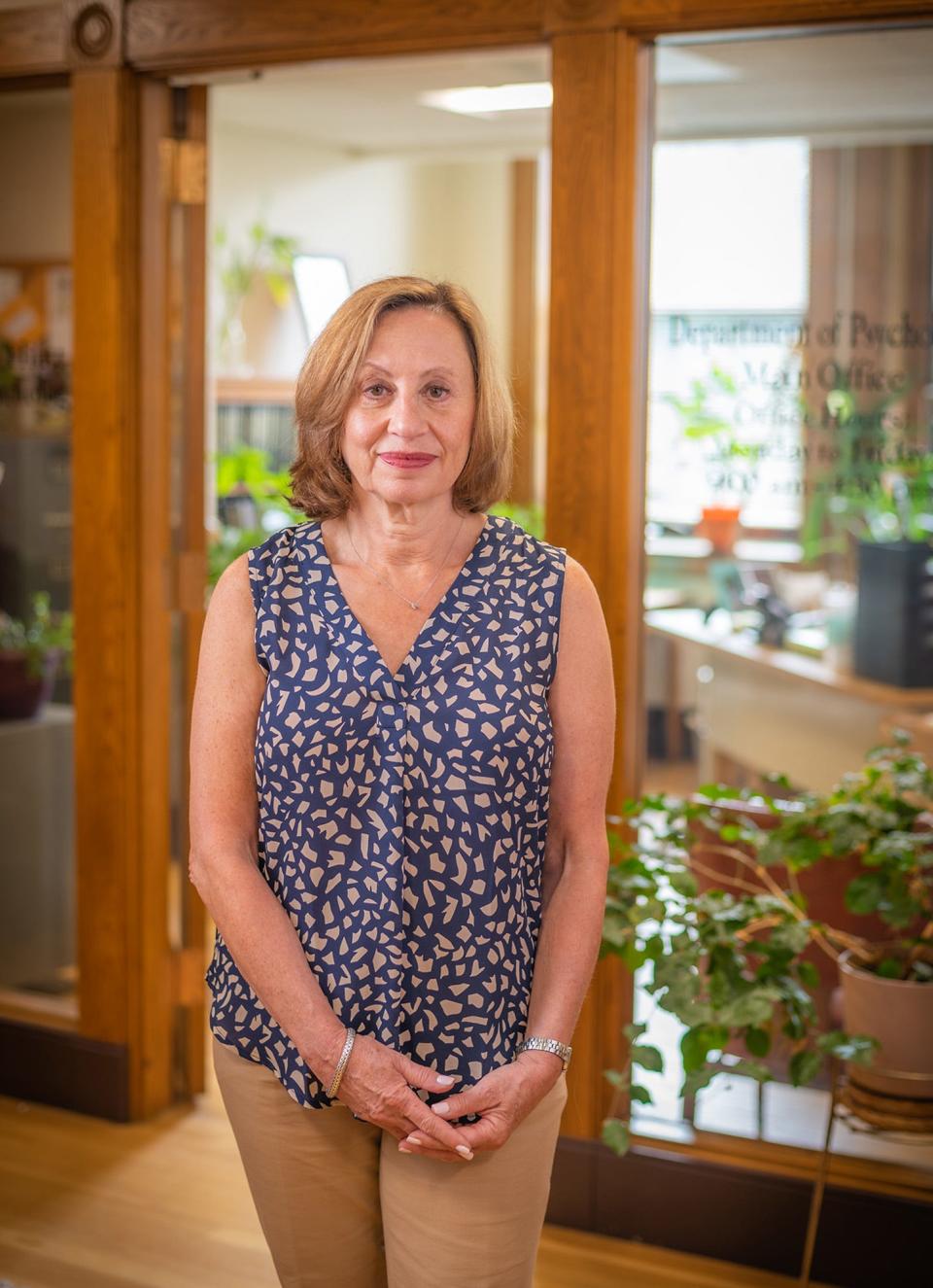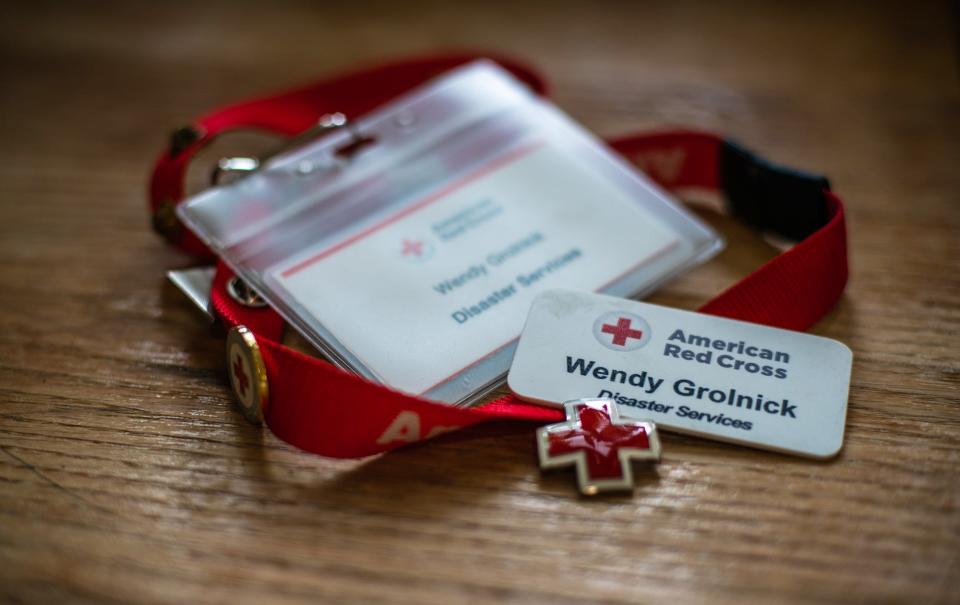Care on the go: Clark psychology prof on scene in wake of disasters across US
WORCESTER — For most people, summer travel usually means trips to the beach, amusement parks or camping — but for Wendy Grolnick, summer travel means visiting the aftermath of natural disasters and school shootings.
Since she started volunteering with the American Red Cross in 2007, the Clark University psychology professor has provided clinical mental health services to the victims of tragic events throughout Massachusetts, as well as the rest of the country.
“It's licensed mental health professionals who want to volunteer their time and are trained in their specialties to help people who are struggling or with problems,” Grolnick said. “So I just thought that would be perfect for me.”
A native of Brooklyn, New York, Grolnick earned her undergraduate degree from Cornell, and her graduate degree from the University of Rochester.

It was at the University of Rochester that she got introduced to the idea of motivation research, she said.
“I just got fascinated by the idea of motivation and how we kind of move from doing things because we have to, doing things because we want to, and being more internally motivated,” Grolnick said.
After getting her start as an attachment researcher looking into parent-child attachment, as well as teaching at New York University, Grolnick said she knew she wanted to end up in the New England region.
“I liked New York in some ways, but it was a tough place to do research because there wasn't a lot of trust in the university,” she said. “People were like, ‘I don't know if I should really be part of something.’“
In 1991, Grolnick finally got her opportunity to get to the New England region and find a community that was very connected with the university at Clark.
“We're so lucky to have a community that we're connected with, that when we do work in studies in the schools or just in the community, there's this mutual relationship and it's just really, really nice to be a part of that,” she said.
New England a home for 30 years
For over 30 years, Grolnick has made New England her home, settling down in Springfield and commuting to Clark where she has continued her research into motivation, particularly children’s motivation.
“I research motivation … children's motivation in school and parenting and how parents can facilitate kids’ motivation,” she said. “The kinds of things that interfere with that ability to facilitate their motivation.”
Trained in clinical psychology, Grolnick said that, as her kids were getting older and she found herself with more free time, she wanted to be able to use her clinical skills and reconnect with the community.
She said she immediately thought of the American Red Cross and began looking into opportunities, coming across a branch called "disaster mental health."
She attended training specifically for helping people after disasters including a session at a Six Flags amusement park with police officers and SWAT team members to simulate an active shooter situation.
“They had people simulating victims, people simulating the shooter,” Grolnick said. “And us going into our roles to reunify people with their kids.”
Almost immediately after completing her training, she began going to local disasters - typically fires - not only to provide mental health services but also other resources to help with their recovery, like money for a place to stay, toiletries and information on how to secure housing.
Counselor on site or on call
The team will have a counselor either on site or on call, she said, in the event that there was a fatality or someone under major duress.
“I've been to such tragic situations where somebody has drowned and they haven't found the body and there's a whole team of first responders looking … there's the families standing around waiting and the Red Cross is providing food and you want to have a mental health person there,” she said.

She said she has been on site for situations where an officer has been shot and, “there's a whole investigation. The place is walled off.”
The Red Cross will feed the police officers on site and give them drinks, as well as provide mental health services to those who are distressed.
While Grolnick has been deployed to many local disasters in Western Massachusetts where she is based, including her first natural disaster in 2011 when a tornado tore through Springfield claiming multiple lives, they've also sent to disasters around the state and around the country.
In 2010, the mental health professional was sent to Worcester to offer support to families and students after a mercury spill occurred at the Grafton Street School.
A sixth grade student brought about half a pint of mercury to school to show a teacher. But the teacher, not knowing it was mercury, poured some of the substance onto her hand.
She tried to return the substance to its container after realizing it may have been mercury, but drops spilled into the classroom, exposing the school to potential mercury poisoning.
“There was a big meeting with the superintendent, and a lot of really upset and scared parents and just not knowing what their kids had been exposed to,” Grolnick said.
The year after the Boston Marathon bombing, Grolnick was at a station near the starting line to provide mental health services.
Deployed after Newtown shooting
In 2012, she was sent on her first national deployment to Newtown, Connecticut, to provide services to the families and members of the community after the shooting at Sandy Hook Elementary School.
“One of the reasons I was asked to go there was because I have an expertise in kids and families and so that's who we were going to be working with the most,” Grolnick said.
Grolnick, as well as other Red Cross volunteers, quickly set up a site at the middle school where families could come in and get services. They often only stay about 10 to 12 days, she said, when they are deployed to national disasters.
“They were 90% families whose children were in the school and were locked down and were in the closet, but they weren't in the classrooms where the children were actually shot,” she said. “But they saw a lot.”
She met with students, as well as parents throughout her visit, many of whom were looking for answers about how best to support their children after the event.
Also present at the time, and that she hasn’t seen since, she said, were mental health providers on site for the mental professionals serving the families.
“There were, I think, a team of three mental health workers and they were just assigned to us,” Grolnick said. “So they checked in with us while we were there. They called me every few weeks to see how I was doing, which is really wonderful.”
To Texas after school shooting
More recently, Grolnick was deployed to a family assistance center in Uvalde, Texas, about a week and a half after the shooting at the Robb Elementary School.
Her team of about 15 people included five from Massachusetts, one from Central Massachusetts, and served anyone who was affected by the shooting "in any way."
The team of mental health staff did intakes of not only families of students who were killed but also families of other students who were in the school, teachers, firefighters and other first responders.
“Usually, in a natural disaster, you would deploy what we call caseworkers that would do these intakes,” she said. “But in this case, we wanted to have mental health professionals who could, as they were talking to the families, see what they needed and be supportive and be helpful that way.”
People had been affected by the shooting in many ways, Grolnick said, with some families experiencing financial or housing issues from not being able to return to work, she said.
There were two other sites where mental health workers provided services including at the memorial site the community had set up near the school where people could get food, snacks and counseling.
“They had almost life-size memorials for each of the children with their pictures on it,” Grolnick said. “People could come in, pay their respects and bring flowers and teddy bears and all, and then there was one in the center of town, as well. People came from all over the country.”
If she is unable to attend a disaster in-person, she provides mental health support virtually, such as when Hurricane Laura hit Louisiana two years ago, or Hurricane Ida hit New York last year.
“I couldn't go, so the people on the ground would refer people to us so we could provide certain support on the phone,” Grolnick said.
While she is unable to volunteer during the school year, as it requires a full-time commitment, she said that she knows she’ll have a full schedule in the summer as, “there’s always a disaster in this country.”
Grolnick said that it is “a real honor” to help people in “some of the worst moments of their lives,” providing them services or something as simple as standing with them as they cry.
“I certainly felt that way after Uvalde and Sandy and Newtown allowed me into their communities to help them," Grolnick said. “So I see it as an honor and maybe that’s all that needs to be said on that.”
This article originally appeared on Telegram & Gazette: Clark psychology professor Wendy Grolnick aids disaster victims in US

